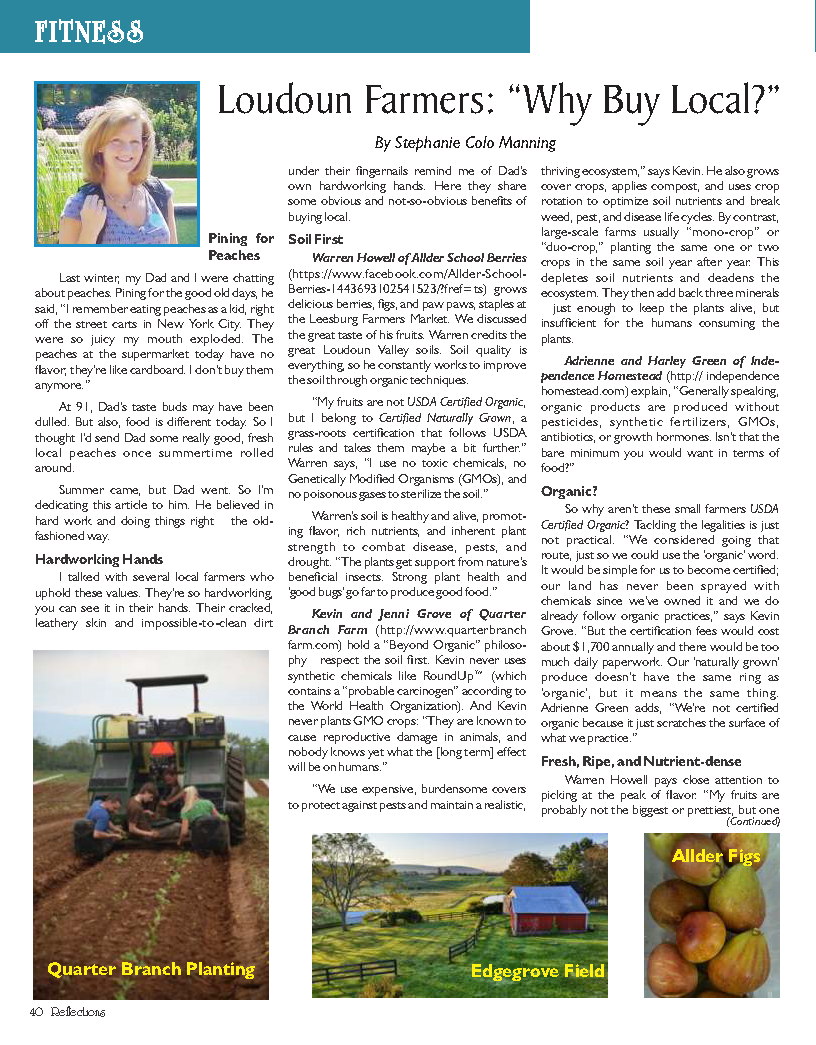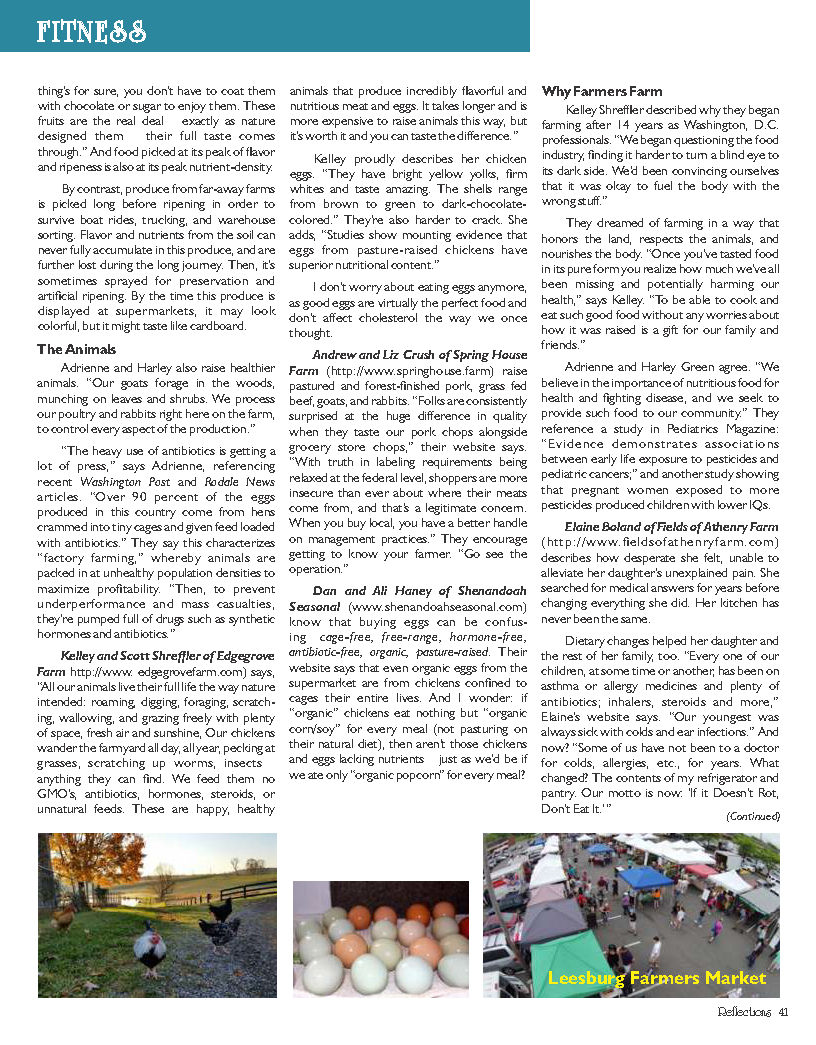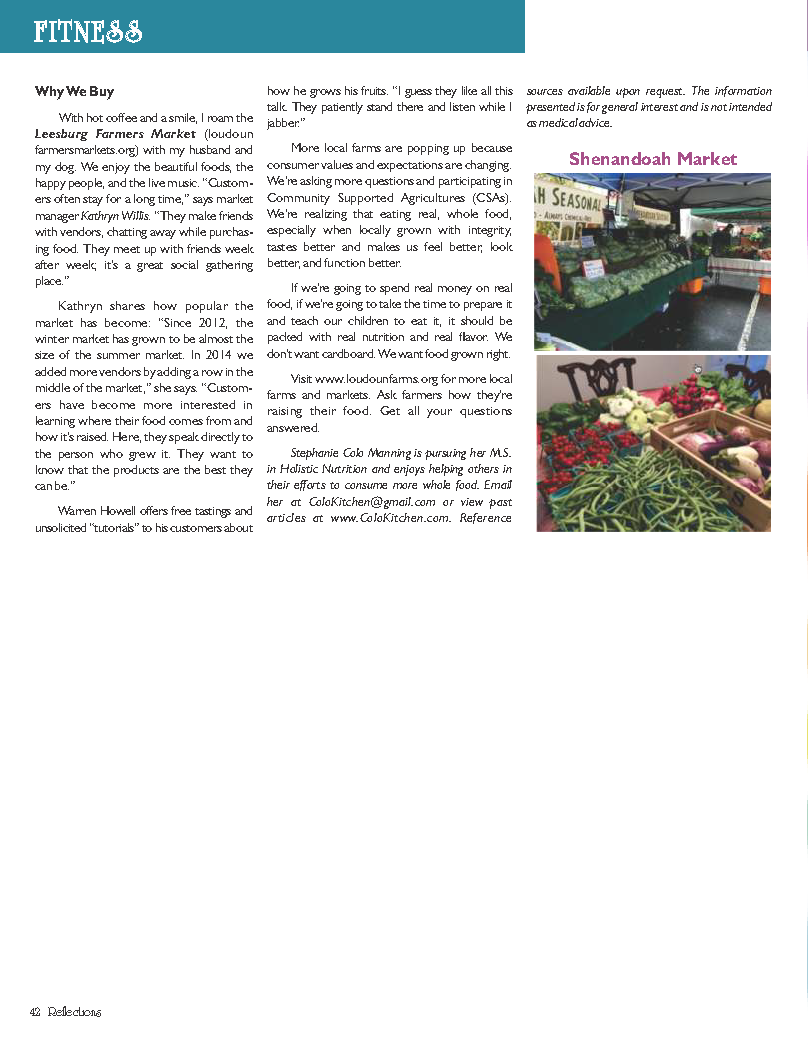Pining for Peaches
Last winter, my Dad and I were chatting about peaches. Pining for the good old days, he said, “I remember eating peaches as a kid, right off the street carts in New York City. They were so juicy my mouth exploded. The peaches at the supermarket today have no flavor; they’re like cardboard. I don’t buy them anymore.”
At 91, Dad’s taste buds may have been dulled. But also, food is different today. So I thought I’d send Dad some really good, fresh local peaches once summertime rolled around.
Summer came, but Dad went. So I’m dedicating this article to him. He believed in hard work and doing things right – the old-fashioned way.
Hardworking Hands
I talked with several local farmers who uphold these values. They’re so hardworking, you can see it in their hands. Their cracked, leathery skin and impossible-to-clean dirt under their fingernails remind me of Dad’s own hardworking hands. Here they share some obvious and not-so-obvious benefits of buying local.
Soil First
Warren Howell of Allder School Berries (https://www.facebook.com/Allder-School-Berries-1443693102541523/?fref=ts) grows delicious berries, figs, and paw paws, staples at the Leesburg Farmer’s Market. We discussed the great taste of his fruits. Warren credits the great Loudoun Valley soils. Soil quality is everything, so he constantly works to improve the soil through organic techniques.
“My fruits are not USDA Certified Organic, but I belong to Certified Naturally Grown, a grass-roots certification that follows USDA rules and takes them maybe a bit further.” Warren says, “I use no toxic chemicals, no Genetically Modified Organisms (GMOs), and no poisonous gases to sterilize the soil.”
Warren’s soil is healthy and alive, promoting flavor, rich nutrients, and inherent plant strength to combat disease, pests, and drought. “The plants get support from nature’s beneficial insects. Strong plant health and ‘good bugs’ go far to produce good food.”
Kevin and Jenni Grove of Quarter Branch Farm hold a “Beyond Organic” philosophy—respect the soil first. Kevin never uses synthetic chemicals like RoundUp™ (which contains a “probable carcinogen” according to the World Health Organization.) And Kevin never plants GMO crops: “They are known to cause reproductive damage in animals, and nobody knows yet what the [long term] effect will be on humans.”
“We use expensive, burdensome covers to protect against pests and maintain a realistic, thriving ecosystem,” says Kevin. He also grows cover crops, applies compost, and uses crop rotation to optimize soil nutrients and break weed, pest, and disease life cycles. By contrast, large-scale farms usually “mono-crop” or “duo-crop,” planting the same one or two crops in the same soil year after year. This depletes soil nutrients and deadens the ecosystem. They then add back three minerals – just enough to keep the plants alive, but insufficient for the humans consuming the plants.
Adrienne and Harley Green of Independence Homestead (http://www.independencehomestead.com) explain, “Generally speaking, organic products are produced without pesticides, synthetic fertilizers, GMOs, antibiotics, or growth hormones. Isn’t that the bare minimum you would want in terms of food?”
Organic?
So why aren’t these small farmers USDA Certified Organic? Tackling the legalities is just not practical. “We considered going that route, just so we could use the ‘organic’ word. It would be simple for us to become certified; our land has never been sprayed with chemicals since we’ve owned it and we do already follow organic practices,” says Kevin. “But the certification fees would cost about $1,700 annually and there would be too much daily paperwork. Our ‘naturally grown’ produce doesn’t have the same ring as ‘organic’, but it means the same thing. Adrienne adds, “We’re not certified organic because it just scratches the surface of what we practice.”
Fresh, Ripe, and Nutrient-dense
Warren Howell pays close attention to picking at the peak of flavor. “My fruits are probably not the biggest or prettiest, but one thing’s for sure, you don’t have to coat them with chocolate or sugar to enjoy them. These fruits are the real deal – exactly as nature designed them – their full taste comes through.” And food picked at its peak of flavor and ripeness is also at its peak nutrient-density.
By contrast, produce from far-away farms is picked long before ripening in order to survive boat rides, trucking, and warehouse sorting. Flavor and nutrients from the soil can never fully accumulate in this produce, and are further lost during the long journey. Then, it’s sometimes sprayed for preservation and artificial ripening. By the time this produce is displayed at supermarkets, it may look colorful, but it might taste like cardboard.
The Animals
Adrienne and Harley also raise healthier animals. “Our goats forage in the woods, munching on leaves and shrubs. We process our poultry and rabbits right here on the farm, to control every aspect of the production.”
“The heavy use of antibiotics is getting a lot of press,” says Adrienne, referencing recent Washington Post and Rodale News articles. “Over 90 percent of the eggs produced in this country come from hens crammed into tiny cages and given feed loaded with antibiotics.” They say this characterizes “factory farming,” whereby animals are packed in at unhealthy population densities to maximize profitability. “Then, to prevent underperformance and mass casualties, they’re pumped full of drugs such as synthetic hormones and antibiotics.”
Kelley and Scott Shreffler of Edgegrove Farm (http://www.edgegrovefarm.com) say, “All our animals live their full life the way nature intended: roaming, digging, foraging, scratching, wallowing, and grazing freely with plenty of space, fresh air and sunshine, Our chickens wander the farmyard all day, all year, pecking at grasses, scratching up worms, insects—anything they can find. We feed them no GMO’s, antibiotics, hormones, steroids, or unnatural feeds. These are happy, healthy animals that produce incredibly flavorful and nutritious meat and eggs. It takes longer and is more expensive to raise animals this way, but it’s worth it and you can taste the difference.”
Kelley proudly describes her chicken eggs. “They have bright yellow yolks, firm whites and taste amazing. The shells range from brown to green to dark-chocolate-colored.” They’re also harder to crack. She adds, “Studies show mounting evidence that eggs from pasture-raised chickens have superior nutritional content.”
I don’t worry about eating eggs anymore, as good eggs are virtually the perfect food and don’t affect cholesterol the way we once thought.
Andrew and Liz Crush of Spring House Farm (http://www.springhouse.farm) raise pastured and forest-finished pork, grass fed beef, goats, and rabbits. “Folks are consistently surprised at the huge difference in quality when they taste our pork chops alongside grocery store chops,” their website says. “With truth in labeling requirements being relaxed at the federal level, shoppers are more insecure than ever about where their meats come, and that’s a legitimate concern. When you buy local, you have a better handle on management practices.” They encourage getting to know your farmer. “Go see the operation.”
Dan and Ali Haney of Shenandoah Seasonal (http://www.shenandoahseasonal.com) know that buying eggs can be confusing—cage-free, free-range, hormone-free, antibiotic-free, organic, pasture-raised. Their website says that even organic eggs from the supermarket are from chickens confined to cages their entire lives. And I wonder: if “organic” chickens eat nothing but “organic corn/soy” for every meal (not pasturing on their natural diet), then aren’t those chickens and eggs lacking nutrients – just as we’d be if we ate only “organic popcorn” for every meal?
Why Farmers Farm
Kelley Shreffler described why they began farming after 14 years as Washington, D.C. professionals. “We began questioning the food industry, finding it harder to turn a blind eye to its dark side. We’d been convincing ourselves that it was okay to fuel the body with the wrong stuff.”
They dreamed of farming in a way that honors the land, respects the animals, and nourishes the body. “Once you’ve tasted food in its pure form you realize how much we’ve all been missing and potentially harming our health,” says Kelley. “To be able to cook and eat such good food without any worries about how it was raised is a gift for our family and friends.”
Adrienne and Harley Green agree. “We believe in the importance of nutritious food for health and fighting disease, and we seek to provide such food to our community.” They reference a study in Pediatrics Magazine: “Evidence demonstrates associations between early life exposure to pesticides and pediatric cancers;” and another study showing that pregnant women exposed to more pesticides produced children with lower IQs.
Elaine Boland of Fields of Athenry Farm (http://www.fieldsofathenryfarm.com) describes how desperate she felt, unable to alleviate her daughter’s unexplained pain. She searched for medical answers for years before changing everything she did. Her kitchen has never been the same.
Dietary changes helped her daughter and the rest of her family, too. “Every one of our children, at some time or another, has been on asthma or allergy medicines and plenty of antibiotics; inhalers, steroids and more,” Elaine’s website says. “Our youngest was always sick with colds and ear infections.” And now? “Some of us have not been to a doctor for colds, allergies, etc., for years. What changed? The contents of my refrigerator and pantry. Our motto is now: ‘If it Doesn’t Rot, Don’t Eat It.’ ”
Elaine explains that our intestines just don’t recognize refined, processed and preserved foods or have the ability to break it down. “It’s like the rubber on the back of a mat. Our intestines go to work like a washing machine. The rubber breaks down and spreads, but never really goes away.”
Why We Buy
With hot coffee and a smile, I roam the Leesburg Farmers Market (loudounfarmersmarkets.org) with my husband and my dog. We enjoy the beautiful foods, the happy people, and the live music. “Customers often stay for a long time,” says market manager Kathryn Willis. “They make friends with vendors, chatting away while purchasing food. They meet up with friends week after week; it’s a great social gathering place.”
Kathryn shares how popular the market has become: “Since 2012, the winter market has grown to be almost the size of the summer market. In 2014 we added more vendors by adding a row in the middle of the market,” she says. “Customers have become more interested in learning where their food comes from and how it’s raised. Here, they speak directly to the person who grew it. They want to know that the products are the best they can be.”
Warren Howell offers free tastings and unsolicited “tutorials” to his customers about how he grows his fruits. “I guess they like all this talk. They patiently stand there and listen while I jabber.”
More local farms are popping up because consumer values and expectations are changing. We’re asking more questions and participating in Community Supported Agricultures (CSAs). We’re realizing that eating real, whole food, especially when locally grown with integrity, tastes better and makes us feel better, look better, and function better.
If we’re going to spend real money on real food, if we’re going to take the time to prepare it and teach our children to eat it, it should be packed with real nutrition and real flavor. We don’t want cardboard. We want food grown right.
Visit http://www.loudounfarms.org for more local farms and markets. Ask farmers how they’re raising their food. Get all your questions answered.
Stephanie Colo Manning holds a Master of Science degree in Holistic Nutrition. The information presented has not been evaluated by the FDA and is not intended to diagnose, treat, prevent, or cure any disease. References available upon request.



